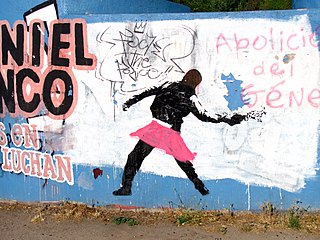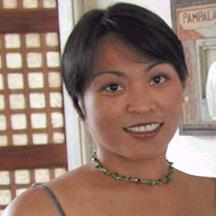
Donna J. Haraway is an American professor emerita in the history of consciousness and feminist studies departments at the University of California, Santa Cruz, and a prominent scholar in the field of science and technology studies. She has also contributed to the intersection of information technology and feminist theory, and is a leading scholar in contemporary ecofeminism. Her work criticizes anthropocentrism, emphasizes the self-organizing powers of nonhuman processes, and explores dissonant relations between those processes and cultural practices, rethinking sources of ethics.

"A Cyborg Manifesto" is an essay written by Donna Haraway and published in 1985 in the Socialist Review. In it, the concept of the cyborg represents a rejection of rigid boundaries, notably those separating "human" from "animal" and "human" from "machine." Haraway writes: "The cyborg does not dream of community on the model of the organic family, this time without the oedipal project. The cyborg would not recognize the Garden of Eden; it is not made of mud and cannot dream of returning to dust."
Neil Joseph Smelser (1930–2017) was an American sociologist who served as professor of sociology at the University of California, Berkeley. He was an active researcher from 1958 to 1994. His research was on collective behavior, sociological theory, economic sociology, sociology of education, social change, and comparative methods. Among many lifetime achievements, Smelser "laid the foundations for economic sociology."
Cyberfeminism is a feminist approach which foregrounds the relationship between cyberspace, the Internet, and technology. It can be used to refer to a philosophy, art practices, methodologies or community. The term was coined in the early 1990s to describe the work of feminists interested in theorizing, critiquing, exploring and re-making the Internet, cyberspace and new-media technologies in general.

Postgenderism is a social, political and cultural movement which arose from the eroding of the cultural, psychological, and social role of gender, and an argument for why the erosion of binary gender will be liberatory.

Wendy L. Brown is an American political theorist. She is the UPS Foundation Professor in the School of Social Science at the Institute for Advanced Study in Princeton, NJ. Previously, she was Class of 1936 First Professor of Political Science and a core faculty member in The Program for Critical Theory at the University of California, Berkeley.

Carolyn Ruth Bertozzi is an American chemist and Nobel laureate, known for her wide-ranging work spanning both chemistry and biology. She coined the term "bioorthogonal chemistry" for chemical reactions compatible with living systems. Her recent efforts include synthesis of chemical tools to study cell surface sugars called glycans and how they affect diseases such as cancer, inflammation, and viral infections like COVID-19. At Stanford University, she holds the Anne T. and Robert M. Bass Professorship in the School of Humanities and Sciences. Bertozzi is also an Investigator at the Howard Hughes Medical Institute (HHMI) and is the former director of the Molecular Foundry, a nanoscience research center at Lawrence Berkeley National Laboratory.

Allucquére Rosanne "Sandy" Stone is an American academic theorist, media theorist, author, and performance artist. She is an Associate Professor Emerita at the University of Texas at Austin where she was the Founding Director of the Advanced Communication Technologies Laboratory (ACTLab) and the New Media Initiative in the department of Radio-TV-Film. Stone has worked in and written about film, music, experimental neurology, writing, engineering, and computer programming. Stone is transgender and is considered a founder of the academic discipline of transgender studies.
Barrie Thorne is a professor of sociology and of Gender and Women's Studies at the University of California, Berkeley.
Feminist epistemology is an examination of epistemology from a feminist standpoint.
Evelyn Seiko Nakano Glenn is a professor at the University of California, Berkeley. In addition to her teaching and research responsibilities, she served as founding director of the university's Center for Race and Gender (CRG), a leading U.S. academic center for the study of intersectionality among gender, race and class social groups and institutions. In June 2008, Glenn was elected president of the 15,000-member American Sociological Association. She served as president-elect during the 2008–2009 academic year, assumed her presidency at the annual ASA national convention in San Francisco in August 2009, served as president of the association during the 2009–2010 year, and continued to serve on the ASA governing council as past-president until August 2011. Her presidential address, given at the 2010 meetings in Atlanta, was entitled "Constructing Citizenship: Exclusion, Subordination, and Resistance", and was printed as the lead article in the American Sociological Review.

Rhacel Salazar Parreñas is Doris Stevens Professor of Sociology and Gender and Sexuality Studies at Princeton University. She previously taught at the University of Southern California, Brown University, the University of California, Davis and the University of Wisconsin–Madison.
Caren Kaplan is professor emerita of American Studies at University of California at Davis, and a figure in the academic discipline of women's studies. Together with Inderpal Grewal, Kaplan has worked as a founder of the field of transnational feminist cultural studies or transnational feminism.

Cyborg anthropology is a discipline that studies the interaction between humanity and technology from an anthropological perspective. The discipline offers novel insights on new technological advances and their effect on culture and society.
Minoo Moallem is an Iranian-born American educator, author, and scholar. She is a Professor of Gender and Women’s Studies at the University of California at Berkeley. Her academic specialties are transnational and postcolonial feminist studies, religious nationalism and transnationalism, consumer culture, immigration and diaspora studies, Middle Eastern Studies and Iranian films, cultural politics. She is best known for her work on Islamic nationalism and fundamentalism as byproducts of colonial modernity and modernization of patriarchies.
Chela Sandoval, associate professor of Chicana Studies at University of California, Santa Barbara, is a noted theorist of postcolonial feminism and third world feminism. Beginning with her 1991 pioneering essay 'U.S. Third World Feminism: The Theory and Method of Oppositional Consciousness in the Postmodern World', Sandoval emerged as a significant voice for women of color and decolonial feminism.
Patricia Zavella is an anthropologist and professor at the University of California, Santa Cruz in the Latin American and Latino Studies department. She has spent a career advancing Latina and Chicana feminism through her scholarship, teaching, and activism. She was president of the Association of Latina and Latino Anthropologists and has served on the executive board of the American Anthropological Association. In 2016, Zavella received the American Anthropological Association's award from the Committee on Gender Equity in Anthropology to recognize her career studying gender discrimination. The awards committee said Zavella's career accomplishments advancing the status of women, and especially Latina and Chicana women have been exceptional. She has made critical contributions to understanding how gender, race, nation, and class intersect in specific contexts through her scholarship, teaching, advocacy, and mentorship. Zavella's research focuses on migration, gender and health in Latina/o communities, Latino families in transition, feminist studies, and ethnographic research methods. She has worked on many collaborative projects, including an ongoing partnership with Xóchitl Castañeda where she wrote four articles some were in English and others in Spanish. The Society for the Anthropology of North America awarded Zavella the Distinguished Career Achievement in the Critical Study of North America Award in the year 2010. She has published many books including, most recently, I'm Neither Here Nor There, Mexicans' Quotidian Struggles with Migration and Poverty, which focuses on working class Mexican Americans struggle for agency and identity in Santa Cruz County.

Ruha Benjamin is a sociologist and a professor in the Department of African American Studies at Princeton University. The primary focus of her work is the relationship between innovation and equity, particularly the intersection of race, justice, and technology. Benjamin is the author of numerous publications, including the books People's Science: Bodies and Rights on the Stem Cell Frontier (2013), Race After Technology: Abolitionist Tools for the New Jim Code (2019), and Viral Justice: How We Grow the World We Want (2022).
The Feminist Studies Department at the University of California, Santa Cruz constitutes one of the oldest departments of gender and sexuality studies in the world. It was founded as a women's studies department in 1974. It is considered among the most influential departments in feminist studies, post-structuralism, and feminist political theory. In addition to its age and reputation, the department is significant for its numerous notable faculty, graduates, and students.
Jane Reid is an evolutionary ecologist from the UK, she is International Chair Professor at the Norwegian University of Science and Technology (NTNU) in Trondheim, Norway and is also Professor of Population & Evolutionary Ecology at the University of Aberdeen.







